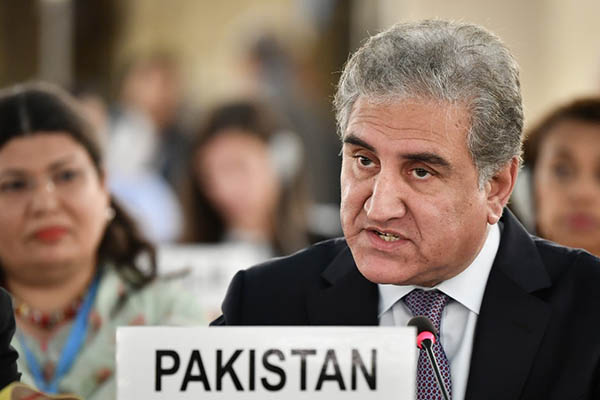
File photo. Fabrice Coffrini—AFP
Foreign minister stresses Islamabad has played role of facilitator, not guarantor, of ongoing Afghanistan peace process
Foreign Minister Shah Mahmood Qureshi on Monday lashed out at India, emphasizing that it had violated its obligations as president of the United Nations Security Council by refusing Pakistan’s request to participate in a special session on the Afghanistan conflict.
“By not acceding to Pakistan’s request, India, in our view, has breached the obligations as president of the UNSC,” he told a press conference in Islamabad. He said that Pakistan had reminded India of its obligations when it assumed leadership of the UNSC for the month of August and it was regrettable it had behaved in a manner unbefitting the responsibility of the office.
Noting that Pakistan should have been invited to the UNSC briefing, as it was Afghanistan’s neighbor and had suffered the most after the war-torn nation due to unrest there, he stressed that no one apart from Kabul had a greater stake in peace and stability in Afghanistan than Islamabad. He also reiterated that Pakistan would continue to serve as facilitator of the Afghan peace process, adding that this did not mean Islamabad was a guarantor. “It is for Afghans to decide their own future,” he added.
The foreign minister regretted a recent surge in accusations of Pakistan’s behavior leading to a failure of the Afghan peace process, recalling that Prime Minister Imran Khan had consistently maintained there was no military solution to the conflict. He reiterated that if Afghan officials had any concerns about Pakistan, they should avail diplomatic mechanisms to boost cooperation between the two nations.
Summarizing Pakistan’s contributions in the Afghan peace process, he said it had helped convince the Taliban to commit to dialogue in 2019 and facilitated the U.S.-Taliban Doha agreement in 2020. Similarly, he said, Pakistan had helped convene the intra-Afghan dialogue.
He clarified that a conference to further facilitate the Afghan peace process had been scheduled to take place in Islamabad—with no Taliban representation—but was postponed on the request of Afghan President Asharf Ghani.
Human rights
The minister said Pakistan was very concerned about reports of violence in Afghanistan and the lack of any substantive progress in intra-Afghan negotiations, adding Islamabad had urged “both sides” to show respect to human rights and international humanitarian laws.
To a question, he said the situation in Afghanistan was evolving and had unfortunately not been managed very well. He said Pakistan had backed a responsible and orderly withdrawal of U.S. and NATO forces from Afghanistan, adding that Islamabad could not, and should not, be held responsible for the failures of others. “We will not be apologetic,” he said.
Economic concerns
Qureshi said Islamabad and Kabul had shared regional objectives, as Pakistan desired peace for economic security and regional connectivity. He claimed Pakistan had been a victim of “spillover” from the Afghan conflict, regretting that the world appeared oblivious to the 80,000 Pakistani lives and billions in monetary losses it had suffered due to the war on terror.
To another question, he said Pakistan had opted for restraint in the “larger interest of peace and stability” over responding to “unfounded and baseless allegations” from some Afghan quarters. He also reiterated that Pakistan would not allow its soil to be used against any one.
Afghan refugees
To a question, Qureshi said Pakistan had continued to facilitate Afghan civilians and transit trade despite the coronavirus pandemic. “Pakistan has been a generous and hospitable host to 3 million Afghan refugees for four decades despite its limited resources,” he said, reiterating that Pakistan did not have the capacity to host any more refugees if there were a new influx.
The minister said it would be the collective responsibility of the international community and other immediate neighbors of Afghanistan to manage any future refugee crisis.
